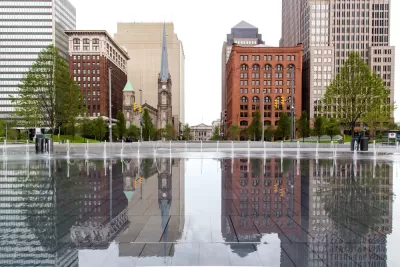The plans for the renovation of Cleveland's Public Square took years to finalize and evolved several times along the way to delivery. Now one final decision will impact bus transit in and around the city.

Ginger Christ breaks the news that Cleveland's reopened Public Square will remain closed to buses. "Three months after the renovated square was set to reopen to bus traffic, Mayor Frank Jackson has announced that will not happen," according to Christ.
The article includes statements from Mayor Jackson and Greater Cleveland Regional Transit Authority (RTA) CEO. The RTA's plan to work around the Public Square focuses on "the city's 'transit zones' – West Third Street to East 18th Street on Superior Avenue, and West Third Street to East 12th Street on St. Clair Avenue," reports Christ. Also, the "RTA hopes to employ traffic signal prioritization and to create dedicated bus lanes to reduce the impact of a closed Public Square."
Those steps are meant to reduce inefficiencies, but they might not be enough to make up for the impact to the RTA's bus system. A study by Nelson Nygaard during the planning phases of the renovation "estimated that RTA would lose $2.6 million a year if the square were to be closed to buses."
Angie Schmitt also voiced concerns about the impact of the Public Square on bus riders in August of 2016, providing five reasons for allowing buses access to the Public Square.
FULL STORY: Cleveland opts to keep Public Square closed to buses

Study: Maui’s Plan to Convert Vacation Rentals to Long-Term Housing Could Cause Nearly $1 Billion Economic Loss
The plan would reduce visitor accommodation by 25,% resulting in 1,900 jobs lost.

North Texas Transit Leaders Tout Benefits of TOD for Growing Region
At a summit focused on transit-oriented development, policymakers discussed how North Texas’ expanded light rail system can serve as a tool for economic growth.

Why Should We Subsidize Public Transportation?
Many public transit agencies face financial stress due to rising costs, declining fare revenue, and declining subsidies. Transit advocates must provide a strong business case for increasing public transit funding.

How to Make US Trains Faster
Changes to boarding platforms and a switch to electric trains could improve U.S. passenger rail service without the added cost of high-speed rail.

Columbia’s Revitalized ‘Loop’ Is a Hub for Local Entrepreneurs
A focus on small businesses is helping a commercial corridor in Columbia, Missouri thrive.

Invasive Insect Threatens Minnesota’s Ash Forests
The Emerald Ash Borer is a rapidly spreading invasive pest threatening Minnesota’s ash trees, and homeowners are encouraged to plant diverse replacement species, avoid moving ash firewood, and monitor for signs of infestation.
Urban Design for Planners 1: Software Tools
This six-course series explores essential urban design concepts using open source software and equips planners with the tools they need to participate fully in the urban design process.
Planning for Universal Design
Learn the tools for implementing Universal Design in planning regulations.
Ascent Environmental
Borough of Carlisle
Institute for Housing and Urban Development Studies (IHS)
City of Grandview
Harvard GSD Executive Education
Toledo-Lucas County Plan Commissions
Salt Lake City
NYU Wagner Graduate School of Public Service




























